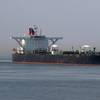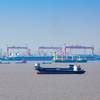Iraq's Southern Exports Unaffected by Conflict
Southern exports average almost 2.60 million bpd; Exports close to record rate seen in May. Lack of Kirkuk northern exports limits overall supply.
Iraq's oil exports from its southern terminals on the Gulf, far from the fighting in its north, have increased so far this month as bad weather and logistical delays subsided, approaching a record high reached in May.
Three months after an advance by Islamic State into northern Iraq sent oil prices soaring to $115 a barrel, the fighting has not reduced Iraq's exports from the south, the main outlet for its crude to world markets.
Exports from Iraq's southern terminals have averaged 2.58 million barrels per day (bpd), according to shipping data for the first 23 days of September tracked by Reuters. Two industry sources who monitor the exports had similar estimates.
Oil industry sources said there has been less impact on exports in September from bad weather and logistical delays, which had held up some shipments in August.
"There are still delays, but they are reduced," said a source with a company that trades Iraqi crude. "The fields are far from the fighting, so that helps."
Southern exports so far in September are up from the average of 2.38 million bpd during all of August and if sustained, would equal May's average of 2.58 million bpd, which was the highest since at least 2003.
Iraq's oil supplies were held back by decades of wars and sanctions. It has been expanding oil production in the south since Western companies signed a series of service contracts with Baghdad in 2010, and boosted export capacity.
Still, a shortage of water - used for injection into oil wells to flush crude to the surface, is hindering production at two mature southern fields - West Qurna-1 and Zubair, official and industry sources said earlier this month.
Total exports from Iraq's northern and southern ports hit a record 2.80 million bpd in February. But northern exports of Kirkuk crude have been shut since March 2 due to attacks on a pipeline to Turkey, keeping total exports below their potential.
While Kirkuk exports remain halted and unlikely to return any time soon in the view of Kirkuk's governor, Iraq's Kurdistan region is exporting smaller quantities of oil independently of Baghdad via Turkey's Ceyhan port.
The Kurdish exports started in May and since then more than 11 million barrels have sailed from Ceyhan, according to a Reuters tally, although diplomatic and legal pressure from Baghdad has delayed some shipments.
By Alex Lawler











